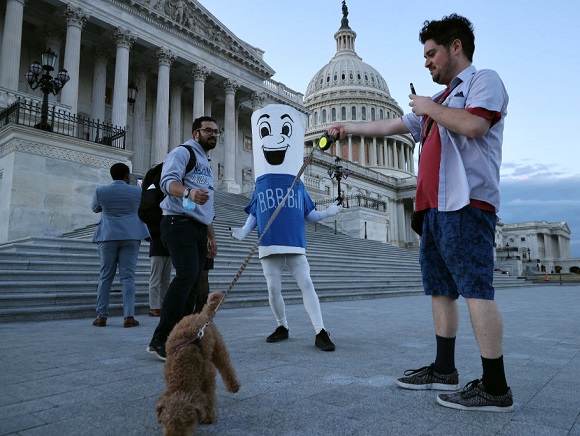President Joe Biden, his administration, and the Democratic leadership claimed for months that the Build Back Better Act would not cost U.S. taxpayers a single penny, despite the hefty price-tag attached to the legislation. New non-partisan analysis by the CBP shows that simply isn’t true, and the bill is projected to add hundreds of billions of dollars to the federal deficit over the next decade. Still, to most Democrats, the cost was never the issue. The House met first thing Friday morning and passed the Build Back Better Act 220-213, with only a single Democrat voting against it.
CBO Shatters Democrats’ Dreams
 The Congressional Budget Office (CBO) released its much-anticipated analysis of the Democrats’ $1.7 trillion climate change and social safety net proposal. Researchers stated that the legislation is not fully paid for and would add, on net, $367 billion to the expected $12 trillion budget deficit over the years 2022 to 2031.
The Congressional Budget Office (CBO) released its much-anticipated analysis of the Democrats’ $1.7 trillion climate change and social safety net proposal. Researchers stated that the legislation is not fully paid for and would add, on net, $367 billion to the expected $12 trillion budget deficit over the years 2022 to 2031.
The Treasury Department noted that enhancing Internal Revenue Service (IRS) enforcement could generate billions more in revenue to cover the shortfall. However, CBO officials explain that these efforts would only raise approximately $127 billion in net revenue, leaving a hole of about $250 billion.
Earlier this month, the Joint Committee on Taxation forecast, which many Democrats touted as the definitive source for Biden’s plan being fiscally responsible, that the White House’s tax plan would only raise $1.5 trillion, still falling short expectations.
“With this bill, members of Congress have a unique opportunity to put our economy on a path to increased growth, productivity, labor force participation, and equity, while ensuring we do not burden future generations with unsustainable debt. I urge them to pass it,” Treasury Secretary Janet Yellen said in a statement.
It was unclear if the worse-than-expected findings would derail House Speaker Nancy Pelosi’s (D-CA) vote. Many centrist Democrats warned that they would not cast a vote until the report was released. As we can see now, however, the results hardly mattered to the House. Democrats still overwhelmingly supported the bill, and Republicans did not. From here, the social spending package must head to the Senate, and that will be the true test. The CBO report could force Sens. Joe Manchin (D-WV) and Kyrsten Sinema (D-AZ) to stand against the bill, as they have had consternation due to inflation concerns and potential electoral fallout.
The True Cost of Build Back Better
Democrats may be using some excellent accounting measures to conceal the actual cost and extent of the Build Back Better Act, or BBBA. For example, the shortfall is projected to add $68 billion in net interest costs throughout the agenda’s time frame, which is absent in many of the headlines and glowing revenues of the initiative. Indeed, there is also the clever maneuvering with sunset clauses.
 The BBBA includes sunsets that could mask the long-term price-tag and the impacts on the national debt. Analysts state that about 40% of BBBA contains front-loaded spending, meaning that approximately $700 billion is spent in the first five years. Many of its expensive proposals, such as universal pre-school and the child tax credit, are temporary. However, if policymakers extend some of these provisions, it is estimated that $2.5 trillion would be added to the deficit, and $200 billion would be tossed into debt servicing payments.
The BBBA includes sunsets that could mask the long-term price-tag and the impacts on the national debt. Analysts state that about 40% of BBBA contains front-loaded spending, meaning that approximately $700 billion is spent in the first five years. Many of its expensive proposals, such as universal pre-school and the child tax credit, are temporary. However, if policymakers extend some of these provisions, it is estimated that $2.5 trillion would be added to the deficit, and $200 billion would be tossed into debt servicing payments.
“‘Zero’ was eventually invoked by its more emphatic supporters to characterize its deficit effects. This view would eventually be tested by rigorous analysis, however, and it has been found to be incorrect,” wrote the American Action Forum. “Over the long term, the deficit effects are likely understated, as the bill relies on temporary spending policy and permanent savings to mask the true cost of the policies.”
As legendary economist Milton Friedman uttered, “There is nothing more permanent than a temporary government program.”
Can Uncle Sam Afford Bidenomics?
For a while, Democrats and Republicans will be watching two movies on the same screen. One side will argue that the CBO vindicates their position. The other will make the same argument from a different perspective. However, the primary number that the White House and Congress should be paying attention to is $35 trillion. This is how much the CBO expects the national debt will be by the time the U.S. rings in the next decade. When interest rates inevitably rise in response to the escalating inflationary pressures, it will be challenging for Washington to maintain astronomical debt levels, no matter who is in charge at the nation’s capital.
~ Read more from Andrew Moran.




